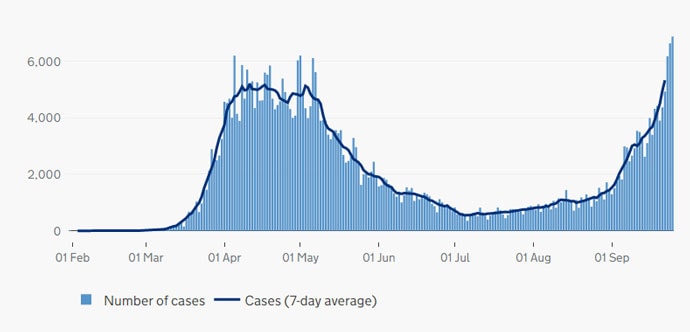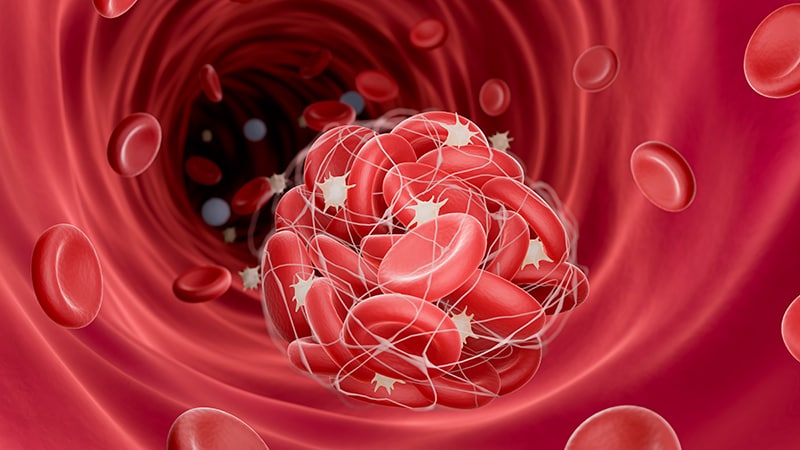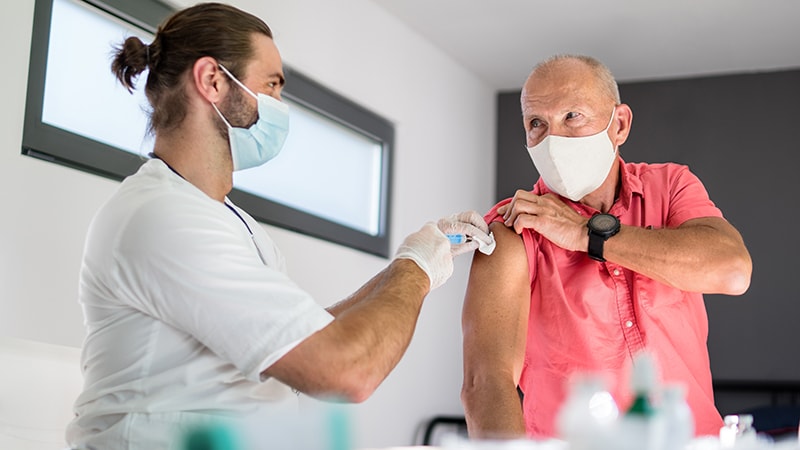These are the UK coronavirus stories you need to know about today.
UK Phase 3 Vaccine Trial
Novavax is starting a phase 3 placebo-controlled trial for its NVX-CoV2373 nanoparticle technology vaccine involving up to 10,000 volunteers.
The trial is part of a deal with the UK Vaccines Taskforce to buy 60 million doses of the vaccine if it is successful.
Participants will be aged 18 to 84 with a quarter over 65, and the trial will prioritise at-risk groups, including people from ethnic minorities. Two jabs will be given 21 days apart.
In a statement the company's Research President Dr Gregory Glenn said: "The data from this trial is expected to support regulatory submissions for licensure in the UK, EU and other countries. We are grateful for the support of the UK Government, including from its Department of Health and Social Care and National Institute for Health Research, to advance this important research."
The Joint Committee on Vaccination and Immunisation (JCVI) today made updated interim recommendations on priorities for vaccinations when jabs are available using a clinical risk and age-based approach.
"Whether health and social care workers should be prioritised above, alongside, or below, persons at highest risk from COVID-19 would depend on the characteristics of the vaccines when they become available and the epidemiology of disease at the time of delivery," it said.
It also said: "Any programme will need to ensure every effort is made to get good coverage in Black, Asian and Minority Ethnic (BAME) groups, in areas of higher socio-economic deprivation, and in areas with outbreaks or high levels of community transmission."
'Rapidly Rising Demand' for GP Appointments
The latest weekly NHS GP appointment statistics for England show a significant rise in appointments attended from 3.9 million at the end of August to 5.2 million in the first week of September.
BMA GP Committee Chair Dr Richard Vautrey commented: "As these figures clearly show, GP practices are coming under significant pressure with rapidly rising demand, concerns related to COVID-19 adding to the expected rise in activity as we move into autumn, and with schools returning."
He added: "Huge numbers of patients have been contacting practices worried that they cannot get tested for possible COVID-19. In addition, practices have also faced the need to respond to the significant impact of the huge backlog of care for those whose procedures have been postponed."
Low Adherence to Test and Trace Isolation
New preprint research found only 10.9% of people told to self-isolate by NHS Test and Trace did so for the full 14 days despite 65% saying they had intended to stick to the guidance.
A key factor for not self-isolating was having a dependent child.
The survey also found only 48.9% of participants were able to identify cough, high temperature/fever, and loss of sense of smell or taste as COVID-19 symptoms.
Only 11.9% of those who thought they had symptoms sought a test.
When it came to sharing details of close contacts with tracers, 76.1% said they would comply.
Data came from a survey of 31,787 UK participants between March and August with the team including researchers from King’s College London and Public Health England.
The authors write: "In order for the test, trace and isolate system in the UK to succeed, people must recognise the key symptoms of COVID-19, self-isolate, request a test, share details of their close contacts and quarantine if contacted."
They also said practical support and financial reimbursement are likely to improve adherence to test, trace and isolate behaviours.
Separate Office for National Statistics data released today show only 41% of adults felt they had enough information about Government plans to manage the COVID-19 pandemic. There were differences between lockdown (35%) and non-lockdown areas (42%).
Half of Symptomatic Key Workers 'Probably Didn't Have COVID-19'
Public Health England (PHE) preprint research presented to the ESCMID Conference on Coronavirus Disease (ECCVID) found 49% of key workers who self-reported COVID-19 symptoms didn't test positive for antibodies later.
Lead author Ranya Mulchandani from PHE in Birmingham said in a news release: "In the course of this study, we tested just under a thousand people who thought they had had COVID-19 due to compatible symptoms. We found that half of them lacked any evidence of having had the infection, testing negative for the presence of antibodies. This was also true for a substantial number of frontline health workers.
"Although these findings are still subject to peer review, it is possible that a large number of people in the general population incorrectly believe that they have already had COVID-19."
Latest Data
UK COVID-19 positive daily reported cases reached their highest level yesterday at 6634. Today's figure was 6874.

There are 1616 patients in hospital with COVID-19 and 243 ventilator bed are in use. Another 34 deaths with 28 days of a positive test were announced. Deaths did not include Scottish data due to a power cut.
The latest Office for National Statistics Infection Survey data show around 1 in 500 people in England have tested positive for coronavirus.
Katherine Kent from ONS commented: "Last week we saw yet another marked increase in COVID-19 infections in England with increases across all age groups but highest amongst those aged 17-24 years old. Our data also suggests a rise in the number of cases in Wales."
New local lockdowns have been announced across South Wales, including Swansea and Cardiff. New measures are coming to Blackpool, Wigan, Stockport, and Leeds.
The UK's R number is up slightly this week from 1.1-1.4 to 1.2-1.5. The growth rate is +4% to +8% per day up from +2 to +7% last week.
Scotland's R is between 1.2 and 1.6.
Northern Ireland's R is 'around 1.5'.
England's R is 1.2-1.5.
Wales' R is 0.7-1.2.
Student Lockdown
Many UK university students are in lockdown attending virtual lectures after outbreaks of COVID-19 cases on campuses, including in Scotland.
Universities Scotland issued advice to remind students not to have parties or mix with others outside their households. It said a "strict ‘Yellow Card/Red Card’ approach is being taken to breaches of student discipline that put students and others at risk".
However, at today's news briefing First Minister Nicola Sturgeon had a message for students: "I know some of you feel as if you have been blamed for the spate of COVID right now, but that's not the case."
Panic Buying
Tesco has followed Morrisons in rationing some key items for shoppers to help avoid empty shelves as cases rise.
There's now a three item limit on flour, dried pasta, toilet roll, baby wipes, and antibacterial wipes.
Vallance's GSK Shares
The Government denied any conflict of interest in chief scientific adviser (GCSA) Sir Patrick Vallance's shareholding in one of the candidate vaccine makers GSK, first reported by the Telegraph.
A spokesperson said: "Upon his appointment, appropriate steps were taken to manage the Government Chief Scientific Adviser’s interests in line with advice provided at the time. The GCSA has no input into contractual and commercial decisions on vaccine procurement which are taken by Ministers following a robust cross-Government approvals regime."
Lockdown Loneliness
More evidence of the impact of lockdown on wellbeing comes in University of Belfast research that found 26.6% of 1964 online survey participants reporting a high score for loneliness. The results are published in PLOS ONE.
Author Jenny Groarke commented: "Our results suggest that support and interventions to reduce loneliness should prioritise young people, those with mental health symptoms, and people who are socially isolated. Supports aimed at improving emotion regulation, sleep quality and increasing social support could reduce the impact of physical distancing regulations on mental health outcomes."
See more global coronavirus updates in Medscape’s Coronavirus Resource Centre.





